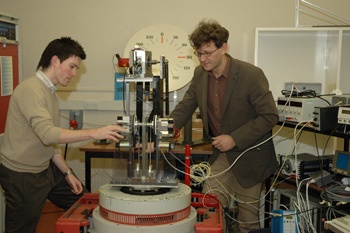A University of Aberdeen PhD student has won a prestigious new training award from The Royal Academy of Engineering.
Bryan Horton is to receive a £5,000 grant for personal development projects as part of his PhD work on a new kind of wave power system.
Bryan's research supervisor, Professor Marian Wiercigroch, Head of Engineering at the University, is delighted for him. He said: "Bryan has proved to be an excellent postgraduate researcher with a unique combination of practical and theoretical skills. For the last year and half he has been working extremely hard on a challenging multidisciplinary project to harvest the energy of sea waves using parametric pendula. This development is in collaboration with two leading Italian research groups at the Universities of Rome and Ancona."
The Academy's award, one of five given this year for the first time, will enable Bryan to broaden his experience whilst at the same time undertaking his research, and will include a study visit to his collaborators in Rome and Ancona this summer, along with a course of Italian language lessons before his trip.
Bryan has developed a mathematical model and has just completed building a scale physical model of the wave-power generator which he hopes to test in a wave tank by late 2007.
"I feel very privileged to receive this award from the Academy," said Bryan, who grew up in Peterhead. "The grant will be really useful and enable me to do some more practical things like learning a new language. My project involves a lot of mathematical modelling and I will now be able to incorporate more practical work to calibrate the predictions and attend the top international conferences."
"The winners of the Royal Academy of Engineering Research Student Development Fellowships are a highly innovative group of young researchers studying important topics such as medicine, energy, security and sport," added Professor Peter Deasley FREng, Lead Assessor for the Awards. "The Fellowships will enable them to initiate technical collaborations with overseas universities and industry and broaden their perspectives by learning languages and developing their individual skills, both technical and cultural."


